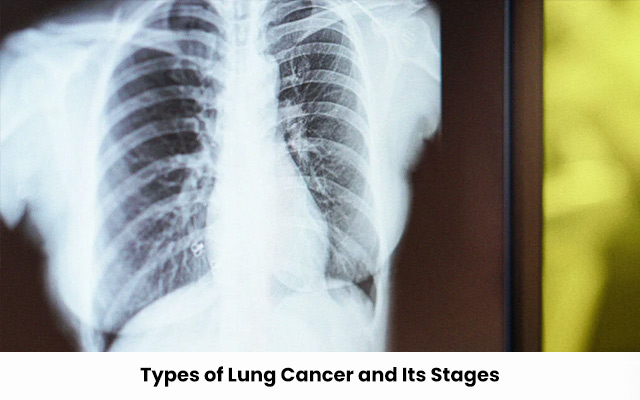Lung cancer occurs when lung cells grow and divide uncontrollably, forming tumours. This abnormal cell division disrupts normal lung function and can spread to other parts of the body. The lung cancer stages determine how far it has spread and which treatment option will be most effective.
Lung Cancer Types
There are two lung cancer types: small-cell lung cancer (SCLC) and non-small cell lung cancer (NSCLC).
- Small Cell Lung Cancer (SCLC): This type is less common but more aggressive, spreading quickly to other parts of the body. SCLC often responds well to chemotherapy and radiation, but it tends to return after treatment.
- Non-Small Cell Lung Cancer (NSCLC): This is the most common type of lung cancer, accounting for about 85% of cases. It grows more slowly than SCLC and has several subtypes, including adenocarcinoma, squamous cell carcinoma, and large cell carcinoma.
Stages of Lung Cancer
Understanding lung cancer stages helps doctors determine the best treatment approach.
- Stage 0: Also known as “in situ,” this is the earliest stage of lung cancer. The cancer is located only on the top lining of the lungs and hasn’t spread to deeper tissues or other parts of the body.
- Stage 1: At this stage, the tumour is still small and localized to one lung, but it has started to grow deeper into the lung tissues.
- Stage 2: The tumour may have grown larger or spread to nearby lymph nodes but is still contained in the chest area.
- Stage 3: At this point, the cancer has spread to the lymph nodes. Treatment becomes more complex, often requiring a combination of surgery, radiation, and chemotherapy.
- Stage 4: This is the most advanced stage, where the cancer has spread to other parts of the body, such as liver, bones, or brain. Treatment during this stage focuses on managing symptoms and slowing the cancer’s progression with chemotherapy, targeted therapy, or immunotherapy.
Treatment Options
Treatment for lung cancer includes:
- Chemotherapy: In chemotherapy, drugs are used to target cancer cells or stop their growth. Chemotherapy is often combined with other treatments, especially in more advanced stages.
- Radiation Therapy: In this high-energy rays are used to target and destroy cancer cells. This is commonly used alongside surgery or chemotherapy.
- Targeted Therapy: This treatment option targets specific mutations in cancer cells, making it more precise than chemotherapy.
- Immunotherapy: With the help of this treatment, your body’s immune system is increased to help your body fight from cancer on its own.
Conclusion
Treatment for lung cancer depends on the lung cancer type and the rate by which it spreads. These treatments are used in rotation with other treatments like surgery to kill the cancer cells effectively.
Visit the best lung cancer doctor in Kolkata to receive the best treatment for lung cancer.

